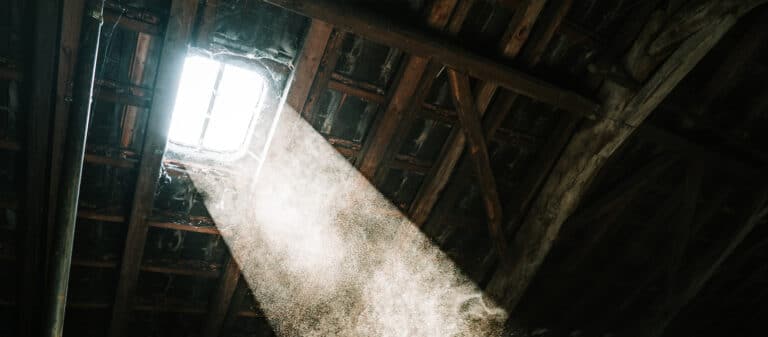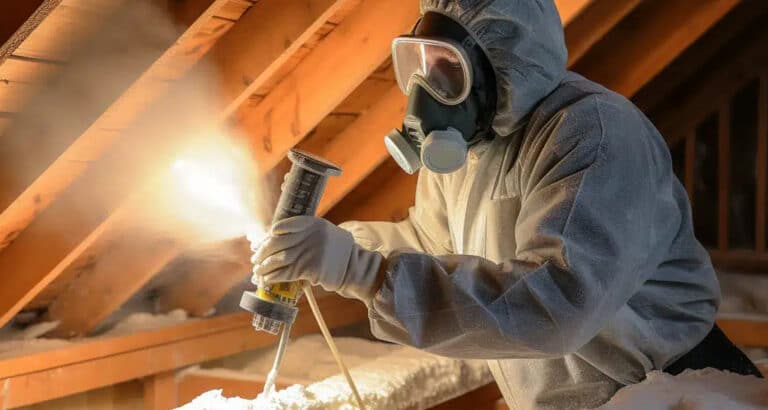The benefits of attic insulation in winter are well known, especially in cold climates like Northeast Pennsylvania. But how does insulation help during the summer?
Wouldn’t adding more insulation make your home hotter by trapping hot air?
While it may seem counterintuitive, home insulation can help regulate indoor air temperature during the summer and place less strain on your HVAC system.
As temperatures continue to rise across the northeast and electricity prices in our great commonwealth, installing new insulation may be the solution to fighting back against rising utility costs.
How Does Insulation Affect Air Temperature in the Summer?
Almost everyone is familiar with heat rising, but this is not the sole source of heat loss during the winter. Only 25% of the heat used to heat your home in the winter is lost through the roof. The rest is typically lost due to poor air sealing and heat transfer between surfaces.
How does this work in the summer? Well, insulating your home doesn’t trap heat during the summer, and it works to actually prevent heat transfer between surfaces.
Since indoor temperatures are naturally cooler, even without an A/C unit working overtime, home insulation acts as a thermal barrier that prevents cool air from escaping and warm air from penetrating.
Think of it this way: your roof is exposed to direct sunlight and warm air all day, so the greater the buffer between that heat and your attic, the cooler it will remain.
6 Benefits of Insulation for the Summer in NEPA
Insulation provides far more benefits than keeping your house cooler during the summer, though this is the primary benefit for most homeowners. Let’s explore.
1. Keeps Your Home Cooler
As previously explained, insulation acts as a buffer to slow down the transfer of heat into your home. This means your home will stay cooler longer, placing less strain on your HVAC system and helping lower utility costs.
Without adequate insulation in your attic, walls, and crawl spaces, you may notice that elevated rooms in your house are significantly warmer and more difficult to cool. In essence, cooling a house without insulation would be like cracking a window to allow the cool air to escape freely.
2. Reduces Energy Bills
According to the U.S. Department of Energy, homeowners can save up to 15% on heating and cooling costs by air sealing and insulating attics, floors, and crawl spaces. While these reductions are mostly experienced during the winter, you can reduce your electricity bills during the summer by a small percentage, which can quickly add up.
In addition, insulation can also reduce wear and tear on your HVAC system, requiring less maintenance and expensive repairs down the road.
3. Improves Indoor Air Quality
According to the Asthma and Allergy Foundation of America, Scranton was voted the allergy capital of the US in 2022. Seasonal allergies can cause massive discomfort for homeowners and rarely just stop in the spring.
One surprising year-round benefit of insulation is fewer allergies, as it will physically block pollen and other airborne particles from entering your home.
If you suffer from seasonal allergies and require antihistamines just to get through the warm months, insulation can help fight back.
4. Lowers the Risk of Mold and Mildew
In addition to fighting back against airborne particles, insulation, in combination with weatherstripping and air sealing, can help prevent moisture intrusion and excess moisture buildup from humidity that leads to mold.
In the latter case, by blocking out hot, moist air, insulation can lower your risk of mold and mildew growth in areas with poor ventilation.
5. Reduces Noise Pollution
Finally, summers in NEPA mean a constant barrage of landscapers, construction projects, road traffic, and kids playing outside. Fortunately, you don’t have to soundproof your home just to achieve noise reduction. Insulation can reduce noise transfer and keep your home quiet and private.
For example, spray foam and blown-in cellulose can absorb sound waves, minimizing the outside noise entering your home.
Areas to Insulate Your Home for the Biggest Impact
If you want to maximize your home’s insulation effectiveness in summer, focus on the following areas:
- Attic: The number one source of heat gain. Heat rises, and in summer, it comes down from your roof into the living space. Insulating your attic will create noticeable differences in your indoor air temperature in upstairs rooms.
- Exterior Walls: Prevent outdoor heat from radiating inside through your walls. This will greatly reduce the strain on your AC.
- Basement/Crawl Space: Insulating these areas can help regulate temperatures on the first floor, where it is already naturally cooler.
- Ductwork: Insulating HVAC ducts prevents energy loss as air travels through unconditioned spaces like attics or crawl spaces.
- Garage Ceilings: Especially if you have living space above a garage, insulating the ceiling can reduce heat transfer.
How to Know If You Need More Insulation
If your HVAC system and current insulation setup aren’t delivering the desired temperature or reduction in bills you’re searching for, here are some signs you may need additional insulation.
- Your upstairs rooms are significantly warmer than downstairs. This indicates heat is penetrating through your attic and exterior walls and rising through your house.
- Your energy bills spike in July and August. These are the hottest months, meaning your HVAC system is working overtime to maintain a consistent temperature.
- Your AC runs constantly or struggles to keep up. Most central air units with a smart thermostat are designed to only run when required. So if you notice your HVAC is always running or running more than normal, it could be a sign of air loss.
- Your attic feels like an oven. While all attics are sweltering during the summer, excess heat or humidity could indicate that additional steps are needed to insulate your home.
A professional energy audit or insulation assessment can help you pinpoint exactly where your home is losing efficiency and what type of insulation you need.
Insulation isn’t just for cold weather. In Northeast Pennsylvania, summers can be long, hot, and humid, making a well-insulated home more essential than ever. From lowering cooling costs and improving comfort to protecting your HVAC system and improving indoor air quality, the benefits of insulation in the summer are undeniable.
Whether building a new home or upgrading an older one, investing in proper insulation will pay off year-round. If you’re unsure where to start, talk to a local insulation professional who understands the unique needs of NEPA homes.
FAQs
Can insulation really keep heat out in the summer?
Yes. Insulation slows heat transfer, meaning it helps prevent hot outdoor air from entering and cool indoor air from escaping.
How much insulation should my attic have in NEPA?
The U.S. Department of Energy recommends R-49 to R-60 for attics in NEPA’s climate zone.
How often should insulation be replaced?
Most insulation can last 20–30 years, but factors like moisture damage, pest activity, or settling can reduce effectiveness. A professional inspection is recommended every few years.











